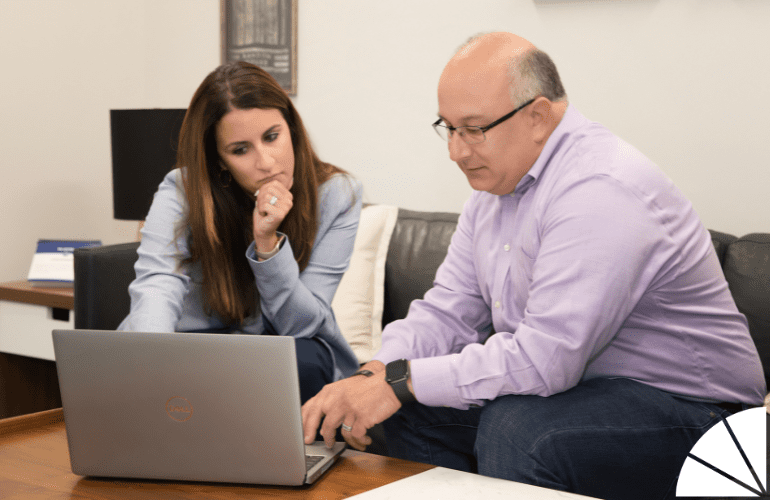
In some circumstances, sleight of hand is a coveted skill. In the world of magic, it’s behind some of the best-kept secrets. However, when it comes to finances, the meaning of the phrase changes from one of skill to one of deception. Amid a complex divorce, spouses may use financial sleight of hand to stage a disappearing act for certain assets or liabilities. Uncovering hidden assets and liabilities during a divorce is one of the functions of forensic accounting.
As a Master Analyst in Financial Forensics, I have seen the inner workings of more than a few spousal tricks and lessons learned. Here, I’m sharing five hypotheticals to illustrate scenarios spouses should be aware of, especially when business assets are involved. Each case also outlines the measures LGA’s Valuation, Forensic Accounting, and Litigation Support Team would take to assist.
#1 “Cryptoppearing” Assets
After 20 years of marriage, Susan’s irreconcilable differences with her husband, John, have led her to file for divorce. John has known for some time that a divorce was inevitable. Because he believes it will be more difficult to track, he has been purchasing cryptocurrency through their shared bank account in an attempt to hide marital assets. Susan notices a rapid decrease in the balance of a shared bank account, but she doesn’t know where John is spending or moving the money.
LGA’s forensic accounting team would track bank statements, follow through to the source of the transactions, and identify balances hidden in cryptocurrency investments. The team would disclose the total value of all cryptocurrency investments and help the couple divide the marital assets based on their total value.
#2 The Transfer Effect
Leslie’s construction company is owned by many different entities, including a developing company, a management company, and a foundation company. Since her husband, Terrel, filed for divorce, she has been transferring money in and out of the different entities to make it appear some entities are faring better than others, but that, overall, the construction company has little value. Based on their pre-separation lifestyle, Terrel has no reason to believe the company isn’t thriving.
LGA’s forensic accounting team would start by looking at all true cash flow for the business and the individuals getting a divorce. The team would reconcile intercompany receivables and payables and quantify income to the marital estate. With the help of our business valuation team, we would prepare a credible and defendable valuation of the business. With a value assigned to the business and income to the marital estate, we would assist the attorneys and couple in dividing the marital assets appropriately.
#3 Not So Lucky Spending
Paul’s paycheck from his IT business was much larger than usual this month. He was angry with his soon-to-be ex-wife, Tara, and decided to spend his extra time and money on a lavish dinner and gambling it away at a casino. In an effort to hide his negligent spending, Paul claimed the cost as a marketing expense for his business. But Tara already saw the charges on their bank statement, and she doesn’t trust him to control his spending during the divorce.
LGA’s forensic accounting team would analyze business and personal cash flows, including bank and credit card statements, and determine if the spending qualifies as dissipation of the marital estate. On the business side, they would analyze the accounts, including advertising expenses, and determine whether there was a misappropriation of assets in the business. The team would work with LGA’s business valuation team, and any discretionary expenses would be an addback in the valuation process. Ultimately, the couple would be able to understand marital income and divide marital assets based on their total value.
#4 The Under Reporting Cash Act
Sara and Tom have been married for fifteen years but are now in the middle of a divorce. Ten years ago, Sara took over her family’s specialty food store in Massachusetts. Over the years, Tom has helped her grow the business. Most of the store’s transactions are handled in cash, and Sara doesn’t intend to share all of the spoils. On the most recent tax return, Sara under-reported the business’s income and hid the remaining cash in the store’s ceiling. Because Tom is involved in the business, he knows income should have been higher than Sara reported.
LGA’s forensic accounting team understands that, for cash-based businesses, there are a few extra steps required to follow the cash trail. The team would go beyond the tax return and check point-of-sale reports, bank statements, and other proofs of sales to ensure all transactions were reported. Massachusetts law requires that each party to a divorce submit a complete and accurate financial statement showing, insofar as possible, the assets, liabilities, and current income and expenses of both parties and children involved in the case. Once the discrepancy was discovered, we could help Sara and counsel to submit a revised financial statement. The couple would then be able to divide their marital assets based on their total value.
#5 Cooking Two Books
Nathan is the owner of a seafood supply company that serves restaurants in New England. He and his wife, Diane, are getting a divorce, and he doesn’t want her to reap the benefits of his hard work. He decides to keep two sets of books. While one is correct, the other is cooked, making the company appear less profitable. But they’ve been married for nearly twenty years. Diane knows Nathan’s spending habits haven’t changed, and she has no reason to believe the company is suffering.
LGA would look at supporting documents, invoices, purchase orders, and other internal records of expenses and revenue streams to ensure they tie out to books. When specific markers and discrepancies are found, we often discover the business has two sets of books. One set of books may be kept on the cash basis of accounting, while the other may be kept on accrual. The team will follow the numbers and sort out the business’s true cash flow. And once again, we would help the couple divide their marital assets based on their total value.
Contact LGA
Divorce can lead to complex disputes, especially when businesses are involved. LGA’s Valuation, Forensic Accounting and Litigation Support Team can help the parties in a divorce uncover the truth behind the numbers, both in their marital estate and business.
As a Master Analyst in Financial Forensics, I help clients uncover potentially hidden marital assets and prepare analyses for litigation support. And as a Certified Valuation Analyst, I can provide business valuation services that support a fair division of all marital assets. Contact me today to discuss your forensic accounting needs.
by Ross Yogel, MBA, CPA, CVA, MAFF






